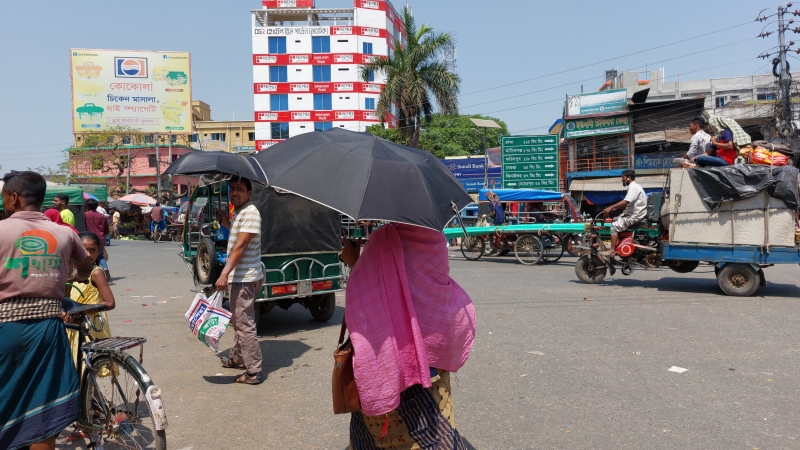- CA Yunus pays homage to Liberation War martyrs on Victory Day |
- Bangladesh capital market extends losing streak for second day |
- Bangladesh celebrates Victory Day Tuesday |
- 'Different govts presented history based on their own ideologies': JU VC |
Tackling Dhaka’s Humid Heat: A Call for Collective Action

Heat wave in Dhaka City on Saturday.
The humid heat that now grips Dhaka with unrelenting intensity has become an unwelcome yet familiar companion for its residents. As the mercury rises and the air grows heavier, life for common people becomes a daily struggle. Commuters packed into crowded buses, street vendors braving the blazing sun, children trying to focus in stifling classrooms—this oppressive heat spares no one.
Weather experts warn that this is not a passing phase but rather the “new normal.” Rising atmospheric temperatures, driven by global climate change, are amplifying urban heat island effects. Dhaka, with its dense population and sprawling concrete jungle, finds itself particularly vulnerable. The lack of adequate greenery only worsens the situation, turning the city into a heat trap.
In response, the Dhaka North City Corporation (DNCC) has unveiled an ambitious plan to plant 500,000 trees this year. This is undoubtedly a commendable step in the right direction, as trees play a vital role in cooling the environment, improving air quality, and providing much-needed shade. However, planting trees alone is not a panacea for the challenges at hand.
A more comprehensive and concerted effort is needed to combat the harsh effects of Dhaka’s warming climate. Urban planning must prioritize increasing green spaces, such as parks, community gardens, and roadside plantations. Authorities should focus on implementing sustainable cooling solutions, like introducing more water bodies and promoting rooftop gardens. Additionally, public awareness campaigns can encourage citizens to adopt environmentally friendly practices in their daily lives.
Moreover, long-term solutions require tackling the root causes of climate change. Policymakers at both national and global levels must commit to reducing greenhouse gas emissions and transitioning to renewable energy sources. The challenges are immense, but the cost of inaction is far greater.
The oppressive heat is not just a climatic issue; it is a reminder of the urgent need for collective action. The DNCC’s tree-planting initiative offers hope, but it must be part of a larger, sustained effort to transform Dhaka into a greener, more livable city. Let us ensure that future generations inherit a Dhaka where stepping outside is no longer an ordeal, but a breath of fresh air.

